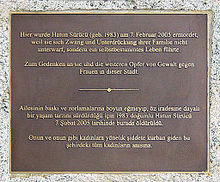Murder of Hatun Sürücü
You can help expand this article with text translated from the corresponding article in German. Click [show] for important translation instructions.
|

Hatun "Aynur" Sürücü (also spelled Hatin Sürücü; 17 January 1982, in
Sürücü was sent to her ancestral village by her family and forced to marry a cousin there at the age of 16. She gave birth to a son, Can, in 1999. In October 1999, she fled her parents' home in
Murder
On 7 February 2005, at a bus stop near her apartment, Sürücü was killed by three gunshots to the head.
Prosecution
In July 2005, the Berlin Public Prosecutor's office charged Sürücü's brothers with her murder. On September 14, 2005, Ayhan Sürücü, the youngest brother, confessed to murdering his sister.
In April 2006, Ayhan was sentenced to nine years and three months in prison, and his two older brothers were acquitted of charges of conspiring to murder their sister. The prosecution appealed on a point of law at the Federal Court of Justice, the Bundesgerichtshof, immediately and the 5th criminal division of the Federal Court of Justice overturned the conviction and allowed the revision. A new criminal proceeding was to take place in August 2008.[4][5]
After completing his sentence on July 4, 2014, Ayhan Sürücü was released from prison and deported from Germany to Turkey.[6]
Public outrage
Sürücü's murder was the sixth incident of "honour" killing since October, 2004.[7] On 22 February 2005, a vigil called by the Berlin Gay and Lesbian association was held at the scene of the crime, which was attended by about 100 Germans and Turks together. A second vigil, called for by German politicians and artists, was held on 24 February. Sürücü's murder, and several similar cases in Germany and elsewhere in Europe have been cited by political opponents of Turkey's admission to the European Union, as an example of disregard for human rights in the Turkish culture. Sürücü was of Kurdish descent.[1][2]
The Sürücü family's behaviour again sparked public outrage when Hatun's sister Arzu applied for custody of Hatun's six-year-old son Can, who has been living with a foster family in Berlin since the murder of his mother.[8] Eight months later, the district court of Berlin-Tempelhof rejected the request.[9] Arzu Sürücü appealed this decision, but the appeal was rejected.[10]
The public continues to demonstrate for Hatun on the anniversary of her death. Activists and citizens lay wreaths in her memory and campaign for help for girls who are faced with forced marriage and honour-related violence. Giyasettin Sayan, a Kurdish politician, complained that no Kurdish representatives were invited to demonstrations after Sürücü's murder, saying, "we are all from Turkey, but we are not all Turks."[11]
Legacy
A bridge in Neukölln, Berlin was named after the victim.[12]
Die Fremde (When We Leave) was the first film released in 2010 inspired by the events. [13]
A Regular Woman, a film, was made about the crime. It was released in 2019. [14]
See also
References
- ^ a b c Goll, Jo (26 July 2011). "Ehrenmord: So brachte Ayhan Sürücü seine Schwester Hatun um". Die Welt – via www.welt.de.
- ^ a b c "Tatmotiv Kultur". Frankfurter Allgemeine, 02.03.2005; F.A.Z., 03.03.2005, Nr. 52 / page 37 (German).
- ^ Beseke, Ulrike (19 Apr 2006). ""Hatuns Bruder hat sie sexuell belästigt"". stern.de (in German). Retrieved 2023-03-20.
- ^ Pressemitteilung des Bundesgerichtshofs Nr. 117/07. August 28, 2007.
- ^ "Sürücü-Mord kommt wieder vor Gericht".
- ^ Berliner Zeitung. "Verurteilt wegen "Ehrenmord": Mörder von Hatun Sürücü abgeschoben". berliner-zeitung.de.
- ^ Banse, Dirk; Laninger, Tanja (16 Feb 2005). "Mordmotiv: Blut für die Ehre - WELT". DIE WELT (in German). Retrieved 2023-03-20.
- ^ Cleaver, Hannah (19 April 2006). "Anger as 'honour killing' family try to adopt victim's son"[dead link]. Telegraph (UK).
- ^ "Kein Sorgerecht für Sürücüs". n-tv.de. 20 December 2006.
- ^ "Sorgerechts-Gezerre um Hatun Sürücüs Sohn". Spiegel Online. 5 February 2007.
- ^ Siemons, Mark (2 March 2005). ""Ehrenmorde": Tatmotiv Kultur". Frankfurter Allgemeine Zeitung. Frankfurter Allgemeine Zeitung GmbH.
- ^ Höppner, Stephanie (2018-02-08). "'Honor killings' in Germany: When families turn executioners". Deutsche Welle. Retrieved 2019-12-29.
- ^ Bartlik, Silke (2010-03-11). "'Die Fremde'". Deutsche Welle. Retrieved 2021-05-15.
- ^ Nurtsch, Ceyda (2019-05-09). "'A Regular Woman': Remembering honor killing victim Hatun Sürücü". Deutsche Welle. Retrieved 2019-12-29.
